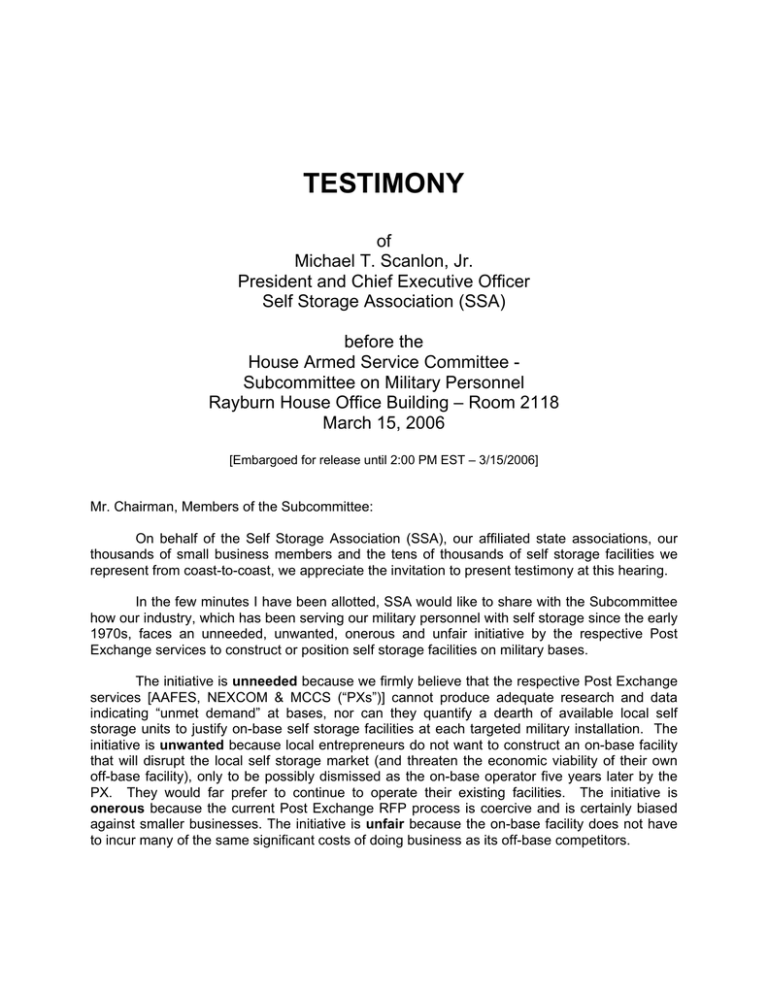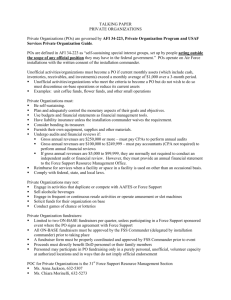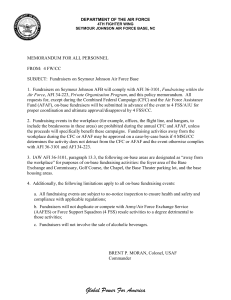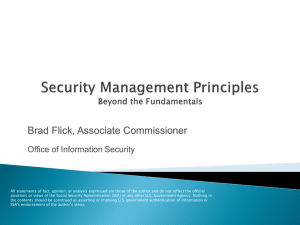TESTIMONY
advertisement

TESTIMONY of Michael T. Scanlon, Jr. President and Chief Executive Officer Self Storage Association (SSA) before the House Armed Service Committee Subcommittee on Military Personnel Rayburn House Office Building – Room 2118 March 15, 2006 [Embargoed for release until 2:00 PM EST – 3/15/2006] Mr. Chairman, Members of the Subcommittee: On behalf of the Self Storage Association (SSA), our affiliated state associations, our thousands of small business members and the tens of thousands of self storage facilities we represent from coast-to-coast, we appreciate the invitation to present testimony at this hearing. In the few minutes I have been allotted, SSA would like to share with the Subcommittee how our industry, which has been serving our military personnel with self storage since the early 1970s, faces an unneeded, unwanted, onerous and unfair initiative by the respective Post Exchange services to construct or position self storage facilities on military bases. The initiative is unneeded because we firmly believe that the respective Post Exchange services [AAFES, NEXCOM & MCCS (“PXs”)] cannot produce adequate research and data indicating “unmet demand” at bases, nor can they quantify a dearth of available local self storage units to justify on-base self storage facilities at each targeted military installation. The initiative is unwanted because local entrepreneurs do not want to construct an on-base facility that will disrupt the local self storage market (and threaten the economic viability of their own off-base facility), only to be possibly dismissed as the on-base operator five years later by the PX. They would far prefer to continue to operate their existing facilities. The initiative is onerous because the current Post Exchange RFP process is coercive and is certainly biased against smaller businesses. The initiative is unfair because the on-base facility does not have to incur many of the same significant costs of doing business as its off-base competitors. 2 Mr. Chairman, as I will discuss further today, SSA believes that, as a basic rule and good public policy, the Federal government should not be in competition with its own taxpaying base, particularly for self storage. At the same time, we believe that the PXs need to remind themselves that the communities in which the military installations are located are made up of the very people who support the military, pay the taxes that fund the payroll, foot the bill for state-of-the-art weaponry and equipment, and provide military pensions. Background on the Self Storage Industry By way of background, the self storage industry in the United States is comprised of 32,000 small business firms that own and operate 45,365 “primary” self storage facilities that total some 2 billion square feet of self storage -- or an area the represents more than 72 square miles of roofing canopy. The vast majority of firms in the “primary” self storage industry, some 22,200 very small business entrepreneurs, own and operate just one self storage facility – it is their livelihood, represents their primary financial investment and their eventual retirement “nest egg.” Also, it should be noted that there are another 9,600 “secondary” self storage facilities as categorized by the US Department of Commerce’s NAISC-SIC classification system – for a grand total of nearly 55,000 self storage facilities in the United States. Thus, the total of small businesses that own and operate just one self storage facility in the US is about 31,800 companies. (Little other data is available concerning these secondary mini-storage facilities.) Contrary to many other PX business ventures in the hamburger or taco business, self storage is not a “franchise” business. That is, unlike fast-food franchises, the operator does not have exclusive territorial rights. All self storage facilities, within a given local market, compete toe-to-toe with one another at the street level. US Military Personnel as Self Storage Customers Our industry currently serves 19.9 million American households (one in every 11) and hundreds of thousands of businesses. According to SSA research done in 2005, we estimate that there are 470,000 self storage units nationwide currently rented by military personnel. While that figure represents about four percent of all the units in the US that are rented to residential consumers, self storage facilities near military bases can have their “occupied units,” rented to military personnel, range from 20% to 95% of total occupancy. (We have submitted research data to this effect to the Subcommittee.) Nationally, we estimate that there are 4,500 self storage facilities, with a market cap value of $12.8 billion, located within a convenient 20minute driving distance of a US military base. There is more than ample private sector self storage availability near virtually every domestic US military installation. 3 Self storage operators located near military bases are noted for their competition to attract and retain military customers. Many incentives and discounts are offered exclusively to those persons with military ID cards, such as: 10% to 30% discounts off rental rates (depending on size of unit and length of contract), free months of rentals, gift certificates, free use of moving trucks or “one-dollar move-ins,” no rent increases while service personnel are deployed overseas, and waiver of security deposits, administration fees, etc. Also, our self storage members are noted for, and have been recognized for, their support for the military in general: donating to and contributing to local efforts that support the troops, such as “Operation Home Front,” mailings of gift packages overseas, serving as a collection area for material being sent overseas, especially during the current operations in Afghanistan and Iraq. The PXs Do Not Have Compelling Data to Support Their Self Storage Initiatives As the Subcommittee knows, the quasi-for-profit Post Exchanges operate under the umbrella of the Federal government. The current frenzy to establish monopolistic, on-base self storage facilities has its genesis in the recent approval of self storage construction by this Subcommittee at Camp Pendleton. SSA questions the rationale exhibited by the respective Post Exchanges to directly compete with private self storage facilities located just outside the gates of bases that have been serving both military personnel and the local populace for more than 30 years. To the best of SSA’s knowledge, the Post Exchanges do not have any compelling data or market research to demonstrate there is either “unmet demand” or a dearth of shortage of self storage capacity adjacent to all 13 military bases where AAFES is targeting on-base facilities. When a base commander declares that self storage is needed on-base, the PXs admittedly -- by way of “research” -- look in the local Yellow Pages for the number of self storage facilities advertised there. Based on this “extensive” investigation of unmet demand, they assume that there are profits there -- ripe for the taking – from on-base self storage. The initiative begins. We herein challenge the respective military branch Post Exchange services to produce the detailed research as to unmet demand and the lack of self storage space availability that justifies their current initiatives to put self storage on many military bases. This research -- which I have no doubt is “voluminous” -- should be available this very day to this Subcommittee and to the public. To the contrary, SSA has supplied this Subcommittee with extensive industry research and evidence that there is ample self storage inventory surrounding all but two of the military base targets of AAFES. 4 The PX Bidding Process: A Game of “Sole Survivor” Once PX management decides it wants to locate a self storage facility on-base -- outside the federal appropriations process -- they must recruit a local business through the RFP process to secure capital and to pay for construction of the facility. Then, in turn, the entrepreneur would recruit and train a staff to manage and operate the on-base facility. However, five years later when the on-base land-lease expires, the facility can be (and in our experience, “has been”) taken over by the PX and the local business person is possibly dismissed and out of the business. The basic question that needs to be asked is “How do the PXs find a willing business person to bid on a project that could wipe out their existing off-base facility – as well as those of their nearest competitors?” Well, based on our experience, in order to find a local bidder, the PXs conduct what we in the self storage industry refer to as the “Sole-Survivor Game:” First, the PXs pit all the current self storage competitors in a given local market -regardless of their size and financial capability -- against one another in a “winner-takeall” RFP process. One business person will win the exclusive, monopolistic rights to construct a self storage facility on the military base. Second, if and when the local self storage owner-operators resist the RFP bidding process, the PXs threaten that the military base commander can go ahead and build these facilities without the Post Exchange RFP process by triggering what they refer to as the “RCI” (appropriated) construction process – a strictly “inside-government” process that is a mystery to any small business person. Unfair Competition and/or Predatory Pricing? Based on AAFES’ published results, they typically price their product and service offerings at 20-25 percent below the competitive rates in the local market. Such a pricing policy in our industry would likely wipe-out or severely disrupt the existing local market self storage competition. As a result, when the PX service bidding announcement arrives in the mail, the local self storage business’ choices boil down to: (1) Either low-ball a bid and win the AAFES self storage “Sole-Survivor” contest or prepare for unfair competition that will likely wipe out your business; or, (2) Resist bidding and hope no other local business person is panicked into a bid – or that the base commander doesn’t “end-run” the whole bid process with the RCI construction process -- and then go ahead and brace yourself for unfair competition that will likely kill off your business. 5 When 20 to 95 percent of your self storage units are rented by military personnel, predatory pricing by any local competitor -- let alone an exclusive on-base monopoly -- in just a matter of days, weeks or months can easily cost you enough lost customers to erode the economic base that has sustained the profitability and viability of your small business. And if one should actually become the “Sole-Survivor” and “win” the RFP process, what do they really “win?” Well, they get handed a five-year land-lease that allows them to go to the bank, use their good credit rating to secure financing for construction of a several million dollar facility for the Post Exchange, only to “rent it up,” train the employees, and then have it possibly “taken away” from them in just five years – just about the time it pays off the bank note. Yes, it’s a bad deal. Why do people bid?...out of fear. Because their only hope is that they can extend their livelihood another five years. Because the only alternative is almost certain business failure at the hands of a new on-base competitor, across the street, behind the military base gate, that has extensive, sustainable competitive advantages and a bragged-about reputation of using predatory pricing! The PX gets a self storage facility on-base (without having to go through the federal appropriation process) with a trained staff and a customer base that has been lured away from the local market competitors. What does the “Sole-Survivor” get? The bum’s rush; he’s out-ofbusiness – certainly on-base…and probably off-base as well. The PX Bidding Process is Anti-Small Business. Depending on the size of facility contemplated on-base, it effectively limits the RFP bidding process to those few self storage owner-operators who have the financial wherewithal to get bank loans to finance construction of large, multi-million dollar on-base facilities. This certainly limits bidding participation to those large developers who have a greater pool of assets to pledge to lenders. The PX initiative, thus, is sentencing many or all of the small self storage owner-operators in the local community around military bases to almost certain business extinction. Also, the larger the on-base facility that is contemplated, the fewer small business owner-operators that are able to bid and/or able to compete with the eventual on-base bidwinner’s unfair competitive advantages. Mr. Chairman, our members are not afraid of investment, business risk and fair competition, but who – at this point in time -- would want to make a major investment near a military installation only to be wiped out by an AAFES decision to build an on-base monopoly? In fact, Mr. Chairman, I would submit that the current Post Exchange RFP initiatives are producing such uncertainty in many markets that it is actually “stifling” any private sector initiatives to develop new self storage facilities or to expand or upgrade (for example, adding climate control) existing facilities anywhere near military bases. 6 On-Base Facilities Would Have Unfair Competitive Advantages SSA is convinced by past AAFES experience that there can never be fair competition where the PX places self storage on-base in direct competition with small businesses situated just outside the gates. There are too many sustainable competitive advantages for the on-base facility that unfairly tilt the playing field and are likely to devastate the already-competitive local self storage market economy. The result of this very stressful “Sole-Survivor” contest would be a local self storage market decimated by the new on-base facility – a business that competes unfairly with facilities just off the base in that it pays no property taxes, that has to invest very little, if anything, on security features, and that likely could pay lower wages to its on-base employees. Perhaps the most significant economic advantage an on-base facility would have over its off-base private enterprise competitor is payment of local property taxes. Property taxes for the typical (mean) US self storage facility (of 44,043 gross square feet) are an average of $2,300 per month (or $28,000 per year) or 21.19% of its total annual costs of doing business* –- a major disadvantage for a local community facility that must compete with an on-base facility that has a $28,000 annual head start, not having to pay similar property taxes. [*NOTE: Data included in “Financial and Operational Characteristics of Self Storage Facilities – 2005 Edition” (page 60) released by SSA in March of last year.] Also, the typical local community facility invests $100,000 or more to install security measures (such as fencing, gates, security services, alarm systems, video cameras, etc.) that would not be necessary within the high-security protection of a US military installation, where uninvited, un-credentialed, unwanted outsiders are prohibited. Also, the average facility spends another $5,000-$10,000 per year in security maintenance (an additional 1%-2% of the annual costs of doing business). Thus, the local community self storage facility would have to spend a total of some $35,000 a year more than an on-base competitor (or nearly 23% of the total costs of doing business). That is a huge, sustainable competitive edge for a monopoly to have over a small business. The economic result of such a sustainable disparity -- within a few minutes of one another -- is quite predictable. It spells devastation. Is it just a “coincidence” that local property taxes average 21.19 percent of cost of doing business for all self storage facilities in the US? And, is it a “coincidence” that AAFES brags on its own Web site (in the first paragraph of text -- I might add) that it (quote) “provide(s) customers an average 22.09 percent overall savings compared to the competition” (end quote). In the real business world – outside the protective gates and security fences provided free by the Federal government -- such language could easily be labeled as “predatory pricing.” The only real difference here in terms of efficiency is that military Post Exchange services are not paying any property taxes or making investments in security features! An onbase self storage facility might end-up employing 4-5 military dependents, but put another 7 handful to scores of small businesses -- and from scores to hundreds of taxpayers out of work in the local community. That type of economics does not add up positively. Also, Members of the Subcommittee should keep in mind, that when our small facility owner-operators go out-of-business in communities adjacent to military bases, that will remove a significant tax base and will have a negative effect on the local community governments. The Subcommittee Should Restate and Enforce Its Policy Regarding On-Base Self Storage AAFES, NEXCOM and MCCS are currently pushing this “Sole-Survivor” contest all over the country. What you end up with, Mr. Chairman, is an old-fashioned county fair game called “WHACK-A-MOLE” (…a self storage initiative pops up over here at an Army post or an Air Force base, then the industry tries to smack it down with a mallet. Then it pops up over here at a Marine Corps installation, we try to hammer it…and it pops up at a Navy base over there). That’s why we’re here today, sir; to put an end to this game. This may be a diversion for the PXs, but I can assure you from the volumes of mail, e-mail and calls we receive on this issue, it is truly a matter of business “survival” for thousands of small firms out here in the real world of business. Most recently, after SSA objected to the five-year land-lease provision in the bidding process, we noticed that AAFES is now indicating that if construction of self storage facilities onbase is a political liability with the established local self storage competition (which it certainly is), then they are considering utilization of “mobile” or “portable” (also known as “containerized”) self storage on the bases. Such a shift of plans on the part of AAFES still results in the same devastating local market economic impact. PXs Must Provide Compelling Evidence Before Self Storage is Permitted On-Base Mr. Chairman, with the exception at Camp Pendleton and one other instance, to our knowledge, this Subcommittee has supported the concept that self storage facilities should not be placed on-base adjacent to communities that already have adequate private sector self storage space available in the local market. We would suggest that the current controversy could be eliminated if the PXs were required to present this Subcommittee and the local market with “compelling research and evidence” as to alleged “unmet demand” and as to an alleged dearth of available self storage inventory adjacent to targeted military bases, versus their current practice of enigmatically estimating “unmet demand” for self storage by simply “walking through the Yellow Pages.” Somehow the “burden of proof” has become twisted around in the rush to revenue by the PXs. In our opinion, the current situation might be outrageous enough compel this Subcommittee to review these PX practices, restate and enforce its policy with regard to placement of self 8 storage on bases by the Post Exchange services. With regard to the underlying policy itself, we would offer up the following suggestion: Whereas, the post exchange services are removed from real world economic competition; and, whereas, the PXs are attempting to supplant the current wellestablished benefits of a free enterprise system with a monopolistic, property taxexempt, anti-competitive system; Be it resolved: That the respective military branch Post Exchanges have the responsibility of a full and complete “burden of proof” placed upon them to demonstrate to this Subcommittee and to the local community involved, on a case-by-case basis, beyond a reasonable doubt that there exists unmet demand for self storage and no adequate supply of local market self storage inventory, before they are permitted to send out the first notice of an RFP for construction or placement of self storage on-base. For our part, as an industry, we concede that there are military base locations (such as Dugway Proving Grounds and Fort Irwin – current AAFES target bases) where little or no self storage availability exists outside the gate. We agree with the concept of AAFES, NEXCOM and MCCS looking into self storage on those bases, after alerting local businesses to the demonstrated need. If local businesses do not respond with private enterprise construction of self storage outside the gate within a reasonable period of time, then we would agree that onbase self storage could be pursued. When it comes to resolving this issue, Mr. Chairman, there are many possibilities, but one possibility is unthinkable and that is to do nothing…and allow the current “Sole-Survivor” bidding process and the “Whack-A-Mole” game of military branch PX service initiatives to threaten the economic stability and livelihoods of small business self storage owner-operators in the local markets surrounding these military bases. These taxpayers and their small businesses have been fair and loyal to their military personnel customers. They do not deserve, nor should they have to cope with, unneeded, unwanted and unfair on-base competition coming from their government, as well as an onerous anti-small business bidding process. Conclusion In conclusion, Mr. Chairman and Members of the Subcommittee, the Federal government and its military branch Post Exchange services should be protecting taxpayers, not putting them out of business. Thank you for hearing what SSA has to say on this important matter. I would be pleased to attempt to answer any questions the Subcommittee members might have.





